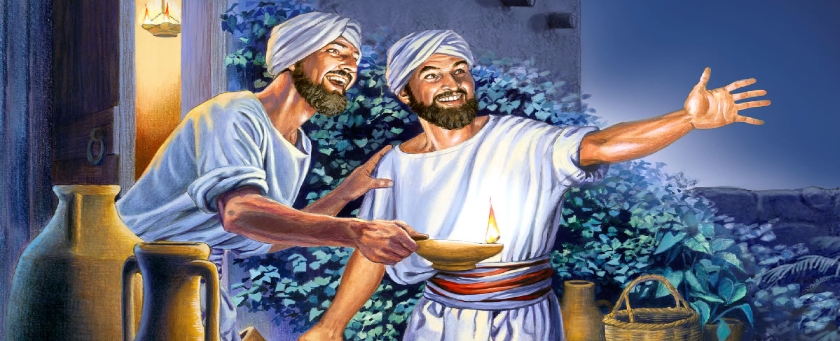Persevere in Faith and Hope
Nineteenth Sunday in Ordinary Time, Year C

Readings:
Wis. 18:6-9; Ps. 33; Heb. 11:1-2, 8-19; Lk. 12:32-48
(Audio recorded live, 7 August 2022)
Last week I spoke about the reason God made us: To know Him, to love Him, and to serve Him on earth, and to be happy with Him forever in heaven. I presented this within the context of wisdom, namely, that to be truly wise, we should use the things of this earth insofar as they help us attain our goal, which is eternal happiness with God in heaven. In other words, we should not grow so attached to the things of the earth that we neglect the things of heaven. By so doing, we will find true happiness even on earth, for one’s life does not consist of one’s possessions. Last week’s readings were about discovering the wisdom of detachment from the world. This week, however, the focus has shifted instead to two fundamental theological virtues: Faith and Hope. Faith in God and Hope in the promise of Jesus, who said, “And if I go and prepare a place for you, I will come back again and take you to myself, so that where I am you also may be” (Jn. 14:3). There is an additional virtue closely linked to Faith and Hope, which is perseverance. Perseverance is the primary message in the passage from the Book of Wisdom, the Letter to the Hebrews, in the Gospel, and even in our Psalm, saying, “Our soul waits for the LORD, who is our help and our shield.” So, let us dive in to the ways in which the virtue of perseverance is presented to us today.
First, the Book of Wisdom was likely written sometime after the Hellenistic influence of the Greeks on the people of Israel. It is more philosophical than previous texts and shows an expansion of thought about God. The passage we heard today is a reflection on the way in which the Israelites kept the Feast of Passover as a perpetual memorial to keep their faith in the salvific activity of God. After the Babylonian Exile, the Israelites saw their restoration to the land as God glorifying them for keeping the faith, even in secret. Their return to the city of Jerusalem was a symbol of heaven on earth, and a reward for their perseverance.
In the Letter to the Hebrews, we heard of the faith of Abraham, who was called out of the land of Ur, which was basically ancient Babylon. He heard the voice and the promptings of God, who led him out of the worldliness of Babylon and into the land of Canaan. God promised Abraham that through Isaac, he will have as many descendants as there are stars in the sky. And after his testing, proving he would remain faithful to Almighty God, this promise was fulfilled. And while Abraham did not see the glory or the splendor of Jerusalem, it was his perseverance in faith that sewed the seeds for generations to come.
Lastly, and most importantly, Jesus teaches us all the value of perseverance. He says, “Do not be afraid and longer, little flock, for your Father is pleased to give you the kingdom.” This is no ordinary kingdom. It is not an earthly kingdom, which is won by war and storing up riches, rather, it is won by letting go and giving away. God has no need of our possessions, nor will we when we are in his kingdom.
Jesus teaches that we are to be prepared, like servants waiting for their master’s return from a wedding. Blessed are those servants who are vigilant, even in the second and third watch of the night. In other words, by persevering in this way, by keeping the faith, and waiting for the Lord, the master will come and wait on them. There is one caveat, however, the servants have to be ready to open the door when the master comes and knocks. Can we hear him knocking on the door of our heart?
St. Peter wants to know if this teaching is for the disciples or for everyone. Jesus answers, “Blessed is that servant whom his master on arrival finds doing so.” We are encouraged to exercise perseverance, even in our darkest hour, even when it seems the master is long delayed. Of course, this is where Faith and Hope can strengthen us. God is trustworthy and always keeps his covenant with his people.
One curious aspect of today’s gospel is the end. Jesus says, “That servant who knew his master’s will but did not make preparations nor act in accord with his will shall be beaten severely; and the servant who was ignorant of his master’s will but acted in a way deserving of a severe beating shall be beaten only lightly.” Knowledge of God’s will is wisdom, and with wisdom comes responsibility to act accordingly. If we listen to the Word of God, but fail to act on it, we are missing the mark. These teachings of Jesus are meant to help us be more fully alive. Who has more life in them: The one who refuses to listen to the Word of God or the one who listens and acts accordingly? As it says in the Book of Revelation, “Behold, I stand at the door and knock. If anyone hears my voice and opens the door, [then] I will enter his house and dine with him, and he with me” (Rev. 3:20). Are we ready to welcome the Lord in this way?
And so, as we contemplate the theological virtues of Faith and Hope active in our lives, and how they lead us to Mass again and again, may the communion we share be a foretaste of heaven to come, and may our perseverance in Faith make us always ready to welcome the master, whenever we gather together at his holy altar.





Share this post
Twitter
Facebook
Pinterest
Email